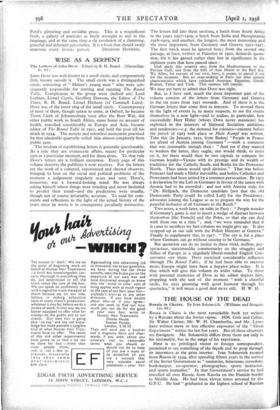WISE AS A SERPENT ,
JOHN DOVE was well-known in a small circle, and comparatively little known outside it. The small circle was a distingujshed circle, consisting of " Milner's young men " who were sub- sequently responsible for starting and running The Round Table. Conspicuous in the group were (indeed- are) Lord Lothian, Lionel Curtis, Geoffrey Dawson, the Editor of The Times, R. H. Brand, Lionel Hichens (of Cammell Laird). Dove was of the inner ring of the small circle. Contemporary of most of them, though senior to some, at Oxford, he became Town Clerk of Johannesburg soon after the Boer War, did other public work in South Africa, came home on account of health, travelled considerably in Europe and Asia, became editor of The Round Table in 1921, and held the post till his death in 1934. The austere and relentless anonymity practised by that admirable quarterly veiled him almost completely from public gaze.
The wisdom of republishing letters is generally questionable. As a rule they are evanescent affairs, meant for particular eyes at a particular moment, and for them alone. To that rule Dove's letters are a brilliant exception. Every page of this volume deserves the publicity it now receives. For the letters are the work of a cultured, experienced and shrewd observer, bringing to bear on the social and political problems of the moment a judgement singularly acute and sane. Dove's, moreover, was a forward-looking mind. He was always asking himself where things were trending and never hesitated to predict their trend—and the predictions were usually, though not of .course invariably, accurate. To read his com- ments and reflections in the light of the actual history of the years since he wrote is in consequence peculiarly instructive. The letters fall into three sections, a batch from South Africa in the years 1907-1909, a batch from India and Mesopotamia 1918-1919, and another, the longest, the most interesting and the most important, from Germany and Geneva 1921-1927.
The first batch must be ignored here; from the second ohe passage, at least, written in Palestine in 192o, demands quota- tion, for it has gained rather than lost in significance in the eighteen years that have passed since :
God made this country one, from the Mediterranean to the Persian Gulf, and from the hills of Asia Minor to the Red Sea. We Allies, for reasons of our own, have, it seems, to parcel it out for the moment. But no map-making at Paris can alter natural characteristics which have outlasted Assyrian, Egyptian, Greek, Roman, Tartar and Turk. This oneness will remain.
We may yet have to admit that Dove was right.
But, as I have said, much the most important part of the volume consists of the letters from Germany and Geneva in the six years from 1921 onwards. And 'of these it is the German letters that come first in interest. To re-read them in the light of events is, in many respects, to see the events themselves in a new light—and to realise, in particular, how successfully Herr Hitler (whom Dove never mentions) has
exploited in the- interests of National Socialism ambitions and tendencies—e.g. the demand for colonies—existent before the putsch of 1923 took place or Mein Kampf was written. Take this (in January, 1922, from Baden) "People in France are afraid of Atistria joining Germany " :—with a comment that was reasonable enough then : " And yet if they wanted
to weaken the latter, they ought, one would think, to insist on it, for there would then be two capitals to compete for German loyalty—Vienna with its prestige and its wealth of
traditions for the Catholic South, and Berlin for the Protestant North. Thus union would spell division." That was before Poincare had made a Hitler inevitable, and before Catholics and Protestants had been united by a common persecution. By 1925 a declaration by the Left in Germany in favour of the union with Austria had to be recorded : and not with Austria only, for " Dr. Hellpach, the Democrat candidate [not that the old
Democratic Party could be called Left] for the Presidency, advocates joining the League so as to prepare the way for the peaceful inclusion of all Germans in the Reich."
Two notes, 'a week later, on talks in Paris : " People wonder if Germany's game is not to insert a wedge of distrust between themselves [the French] and the Poles, so that she can deal with them one at a time "; and, "we were reminded that if it came to sacrifices we had colonies we might give up. It also cropped up in our talk with the Polish Minister at Geneva." Finally to supplement this, in 1927: " The cry- is for a place where Germans can go without ceasing to be Germans."
But quotation can do no justice to these vivid, mellow, per- spicacious, statesmanlike commentaries on the struggles and follies of Europe as a singularly liberal-minded English Con- servative saw them. Dove exercised considerable influence through The Round Table; if he had been able to exercise more, Europe might have been a happier place today. It is that which will give this volume its wider value. To those with personal memories of Dove as his editor depicts him, grappling with the task of the moment " with a cheerful smile, his eyes gleaming with good humour through his spectacles," it will mean a good deal mere stall. H. W. H.














































 Previous page
Previous page